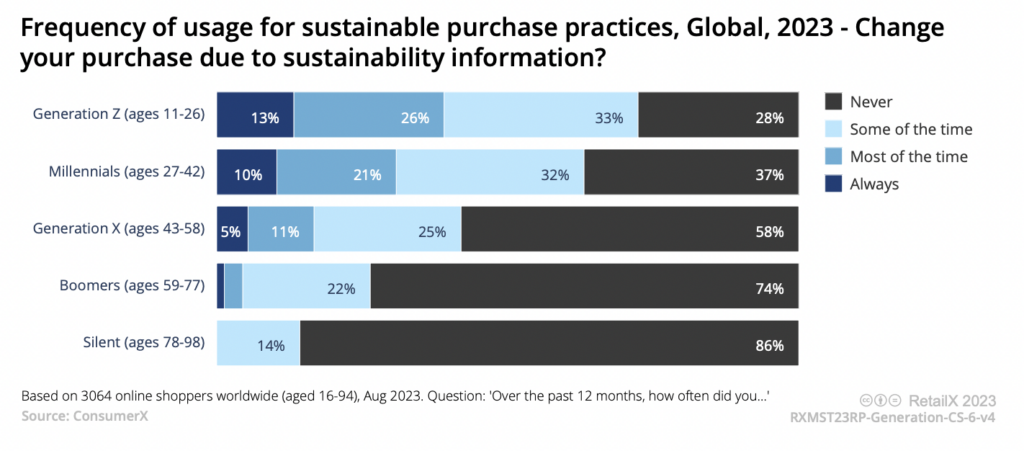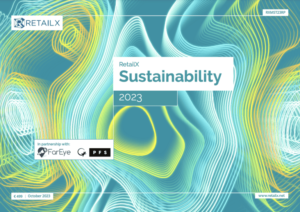Generation Z is heralded as the conscious generation, caring more than other age groups about the planet and sustainability. Millennials too are champions of environmental and social issues and this concern extends to consumers around the world. In fact, less than 5% of people in any given age group say they aren’t worried about the environmental impact of the retail industry, according to RetailX research.
77% of Gen Z shoppers, and the same percentage of Millennials, want retailers to be ecologically sustainable and a third of them feel very strongly about it. While the figures drop off for older generations, there are still 68% of Boomers and 62% of the Silent Generation, who are aged 78 and above, believing that retailers should be ecologically sustainable.
A higher proportion of consumers want retailers to have fair workplace practices and ensure the companies that supply them also have high standards of staff and community welfare. 84% of consumers surveyed by RetailX globally agreed or strongly agreed with this sentiment.
What consumers buy
Consumers have been following up on these environmental beliefs by buying more sustainably. Groceries and clothing are the two categories they are most likely to have bought a sustainable option from in the last 12 months. Almost half of the consumers surveyed (47%) have bought groceries that make sustainable claims, such as organic or fairtrade, and 45% have purchased clothing that has a lower environmental or social impact. 28% of shoppers have bought beauty & cosmetics or shoes that are aligned with their environmental concerns. A third of online consumers have bought clothes secondhand.
Over the same timeframe, 56% of Gen Z have bought sustainably aligned fashion and 48% have purchased groceries that have been grown or produced in a more ecological manner. The same two categories are the most frequently purchased by older age groups as well.
Some consumers are willing to spend a higher amount for products that make the right claims – more than 50% of Gen Z, Millennials and Gen X have done so – but a large proportion of shoppers say that they don’t always fully understand the environmental impact of what they are buying or have access to the right information. 73% of consumers globally say the ecological impact of purchases needs to be clearer to shoppers. This is especially important for the 17% of shoppers who always look for environmental provenance before making a purchase and the 27% that do so “most of the time”.

The sustainability information provided with a product is enough to alter consumer decisions in store or when they are browsing online. More than half of the surveyed consumers say they have changed their purchase due to the sustainability information provided.
A localised view
There is still a gap between the products consumers want to buy and what they actually purchase. Price is a major factor here as consumers say they have often opted to buy a cheaper product that doesn’t have the same environmental criteria as the one they would prefer to purchase. 14% of consumers in China say they always buy nonsustainable products because sustainable ones are too expensive or inconvenient. This is above the global average of 10%. A further 33% of consumers in China say they buy a cheaper non-sustainable alternative “most of the time”. The situation is similar in India.
China and India also have a high percentage of consumers who always choose a sustainable product when one is available, even if they have to pay a premium. 24% of Chinese consumers have bought a sustainable product when available every time they shopped in the last 12 months, as did a quarter of consumers in India.
Shoppers in the US, UK, Canada and Australia are more reluctant to pay premium prices. When asked the same question by RetailX researchers, just 10% of US consumers said they would have bought a sustainable product where available every time they shopped in the last year. This is true of 6% of surveyed consumers in the UK, 6% in Canada and 7% in Australia.
Away from these principled shoppers, the majority of people will pay a premium on occasions. They are also likely to be on the lookout for sustainability information when shopping.
This feature was authored by Emma Herrod, and originally appears in the RetailX Sustainability 2023 report.
This year’s research highlights the extent to which the RetailX Global Top1000 are sharing their sustainability journeys with customers and how customers are shopping with sustainability in mind.
Find out how sustainability permeates all areas of retail from the pressures being placed on retailers by legislation and changing customer behaviour, through operations to final mile delivery and new business models.










